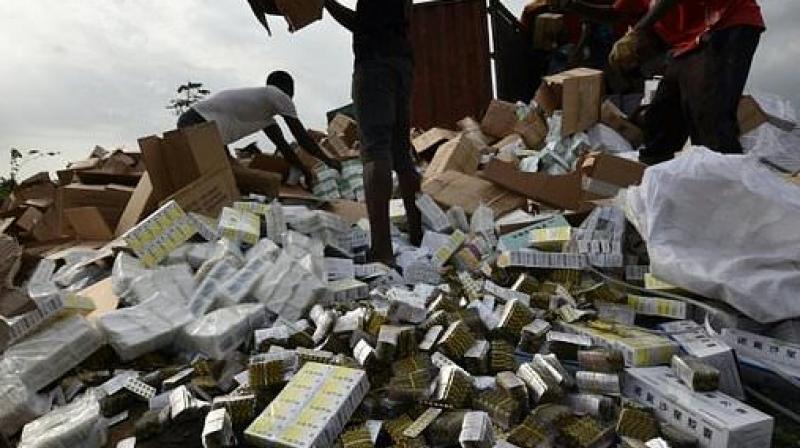Pharmaceutical waste is any waste that contains medicinal drugs that are expired, unused, contaminated damaged or no longer needed. Pharmaceutical waste can result from many activities and locations in a healthcare facility. If you have a compounding pharmacy on site, it generates drug waste. Anywhere medicines are employed can be the site of spills, half-used bottles, IV equipment with residual medicine on it. Waste drugs or pharmaceuticals can pose a special treatment and management challenge. Small quantities at households can often be thrown away in the municipal waste stream (perhaps with some makeshift method of denaturing or making the drugs undesirable to interlopers). Large quantities kept at pharmacies, distribution centers, hospitals, etc. must be managed to minimize the risk of release or to exposure to workers and the public.
This category of waste includes expired, unused, and contaminated pharmaceutical products including vaccines and biological products used for therapy. Prescription and over-the-counter drugs end up as pharmaceutical waste as does paraphernalia used in pharmacies: gloves, masks, bottles, etc.
In the past, health care facilities would routinely flush waste pharmaceuticals down the drain. Now biologists have found residual pharmaceuticals in fish and the aquatic ecology and we are understanding how bad the untreated disposal of drugs are. As responsible citizens and waste managers, we need to keep the Precautionary Principle in mind.
WHO Guidelines on Disposal of Pharmaceutical
In general, expired pharmaceuticals do not represent a serious threat to public health or to the environment. Improper disposal may be hazardous if it leads to contamination of water supplies or local sources used by nearby communities or wildlife. Expired drugs may come into the hands of scavengers and children if a landfill is insecure. Pilfering from a stockpile of waste drugs or during sorting may result in expired drugs being diverted to the market for resale and misuse. Most pharmaceuticals past their expiry date become less efficacious and a few may develop a different adverse drug reaction profile. There are some categories of expired drugs or defective disposal practices that carry a public health risk. The main health risks are summarized below.
• Contamination of drinking water must be avoided. Landfills must be sited and constructed in a way that minimizes the possibility of leachate entering an aquifer, surface water or drinking water system.
• Non-biodegradable antibiotics, antineoplastics and disinfectants should not be disposed of into the sewage system as they may kill bacteria necessary for the treatment of sewage. Antineoplastics should not be flushed into watercourses as they may damage aquatic life or contaminate drinking water. Similarly, large quantities of disinfectants should not be discharged into a sewerage system or watercourse but can be introduced if well diluted.
• Burning pharmaceuticals at low temperatures or in open containers results in release of toxic pollutants into the air. Ideally this should be avoided.
• Inefficient and insecure sorting and disposal may allow drugs beyond their expiry date to be diverted for resale to the general public. In some countries scavenging in unprotected insecure landfills is a hazard.
• In the absence of suitable disposal sites and qualified personnel to supervise disposal, unwanted pharmaceuticals present no risk provided they are securely stored in dry conditions. If stored in their original packing there is a risk of diversion and to avoid this they are best stored in drums with the pharmaceuticals immobilized. ALSO SEE: How to Dispose Chemical Waste in Nigeria






